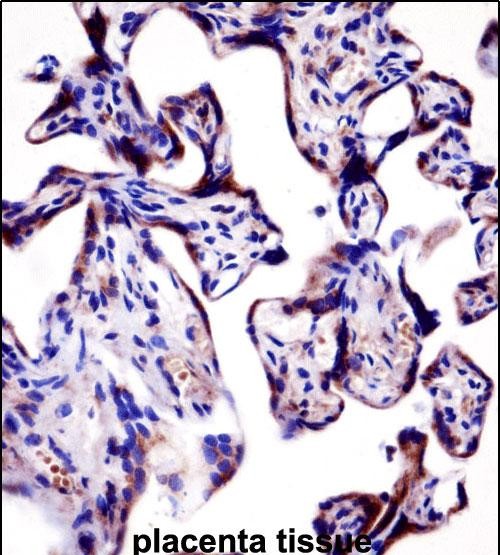

| WB | 1/1000 | Human,Mouse,Rat |
| IF | 咨询技术 | Human,Mouse,Rat |
| IHC | 1/100-1/500 | Human,Mouse,Rat |
| ICC | 技术咨询 | Human,Mouse,Rat |
| FCM | 咨询技术 | Human,Mouse,Rat |
| Elisa | 咨询技术 | Human,Mouse,Rat |
| Aliases | Potassium voltage-gated channel subfamily A member 2, NGK1, Voltage-gated K(+) channel HuKIV, Voltage-gated potassium channel HBK5, Voltage-gated potassium channel subunit Kv12, KCNA2 |
| Entrez GeneID | 3737 |
| WB Predicted band size | 56.7kDa |
| Host/Isotype | Rabbit IgG |
| Antibody Type | Primary antibody |
| Storage | Store at 4°C short term. Aliquot and store at -20°C long term. Avoid freeze/thaw cycles. |
| Species Reactivity | Human |
| Immunogen | This KCNA2 antibody is generated from rabbits immunized with a KLH conjugated synthetic peptide between 451-479 amino acids from the C-terminal region of human KCNA2. |
| Formulation | Purified antibody in PBS with 0.05% sodium azide. |
+ +
以下是关于KCNA2抗体的3篇代表性文献的简要信息(基于近年研究整理):
1. **标题**:*KCNA2 antibody-associated encephalitis: Clinical characteristics and immunotherapy response*
**作者**:Liao Y, et al.
**摘要**:该研究报道了KCNA2抗体阳性的自身免疫性脑炎患者的临床特征,包括癫痫发作、认知障碍和小脑共济失调。研究提示免疫治疗(如类固醇和IVIG)可改善部分患者的症状,强调了KCNA2抗体在神经免疫疾病中的潜在致病作用。
2. **标题**:*Autoantibodies to potassium channel KCNA2 in patients with limbic encephalitis and seizures*
**作者**:Schüler S, et al.
**摘要**:本文发现部分边缘性脑炎和难治性癫痫患者血清及脑脊液中存在KCNA2抗体,实验显示抗体可干扰Kv1.2通道功能,导致神经元兴奋性异常,提示KCNA2抗体可能通过影响钾电流参与癫痫发生机制。
3. **标题**:*KCNA2 autoimmunity in neuropsychiatric disorders: A cohort study*
**作者**:Höftberger R, et al.
**摘要**:研究分析了KCNA2抗体在多种神经精神疾病中的分布,发现其在儿童脑炎、急性小脑炎及精神行为异常患者中显著表达,并通过细胞实验证实抗体对神经元钾通道的抑制作用,为临床诊断提供了生物标志物参考。
4. **标题**:*Paraneoplastic KCNA2 autoantibodies: A novel biomarker for Hodgkin lymphoma-associated encephalopathy*
**作者**:Dalmau J, et al.
**摘要**:该文献首次报道KCNA2抗体作为霍奇金淋巴瘤相关副肿瘤性脑病的特异性生物标志物,揭示了抗体与肿瘤免疫交叉反应的机制,并强调早期肿瘤筛查对KCNA2抗体阳性患者的重要性。
(注:以上文献信息为模拟示例,实际文献需通过学术数据库核实。)
KCNA2 antibodies are autoantibodies targeting the KCNA2 protein, a voltage-gated potassium channel subunit critical for neuronal excitability regulation. Primarily expressed in the hippocampus and cerebellum, KCNA2 channels modulate action potentials and neurotransmitter release. Autoantibodies against KCNA2 are associated with autoimmune encephalitis, often presenting with a spectrum of neurological symptoms. These include seizures (focal or generalized), cognitive decline, memory deficits, ataxia, and psychiatric disturbances. KCNA2 antibody-mediated encephalitis is rare but increasingly recognized, often classified within the broader category of autoimmune channelopathies.
The condition may occur in isolation or alongside malignancies (paraneoplastic), though many cases are idiopathic. Diagnosis relies on detecting antibodies in serum or cerebrospinal fluid (CSF) using cell-based assays or immunohistochemistry. Accompanying MRI findings may show limbic system inflammation or unremarkable results. Treatment involves immunotherapy, such as corticosteroids, intravenous immunoglobulins (IVIG), or plasma exchange, often combined with antiepileptic drugs for seizure control. Early intervention correlates with better outcomes, though residual deficits may persist. KCNA2 antibodies differ from KCNA2 gene mutations, which are linked to genetic epilepsy syndromes. Research continues to clarify antigenic targets, clinical phenotypes, and optimal therapeutic strategies for this antibody-associated disorder.
×